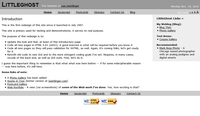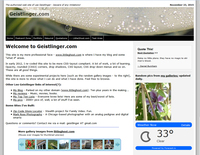I’ve been on the internet for a long time – before the World Wide Web was popular. I first went online in 1992 or 1993, and while Sir Tim Berners-Lee had made public the first web browser in 1991, this was more of an academic tool. Not for your average user.
I had an dial-up account with Delphi because I had read about this internet thing and it sounded interesting. It was all command-line, and – though I didn’t know it at the time – I was doing UNIX commands. It was a very primative space, with a host of strange protocols and functionalities: Gopher, Finger, Archie, Veronica.
Want to download an image? Go to a Gohper or FTP site, download the image, run it through a UUDECODE program, and then direct that output to the appropriate image converter so it will display correctly (JPG, GIF was about all there was at the time). Not exactly as user-friendly as Flickr, that’s for sure!
My Delphi connection? Over a 1200 baud dial-up modem. I quickly upgraded to a 2400 baud modem, and then the format wars intruded. To get a fast (5600 baud), you had to choose between an X2 or Kflex flavor of modem. Some ISPs supported both, some just the one. What a mess…
I mention all this just to show that, as far as connectivity goes, I’ve been through most of it.
And if I had to pick the inflection points – where things really changed online – here are the points I’d pick.
The Web
More than any other development in the arc of the internet’s history, the release and use of a graphic interface to the internet did more to make the internet part of everyday life than any other single development/tool to date. Mosaic, the first popular browser, came out in 1993 and quickly picked up steam (was kind of frustrating to install – what’s a winsock??).
Links, inline pictures, backgrounds and all that HTML had (at the time) to offer just created an explosion of sites, blogs and a truly world-wide web of information.
Think about it – everything we take for granted today probably would not have happened if not for the web: Google, Yahoo!, Amazon, YouTube and so on. Back in the late 1990s and into the 2000s, it was hip to have a web page, especially for your company. Then it morphed into you had to have a company web site, to today, where it’s unthinkable for a company to not have a web presence. It’d be like not having a phone number.
And the web gave rise to a new type of company – the virtual company: Google, Yahoo!, Amazon, Facebook, WordPress and so on. They only exist on the internet (to be fair, Amazon – for whatever reason – just opened a physical book store in Seattle. There may be more to come). Some of these are multi-billion dollar companies, and they only exist in a browser/app.
And these virtual companies are, in some cases, a completely different type of company. Sure, at Amazon you can buy books, just online instead of driving to Borders or Barnes & Noble.
But what about Facebook? Snapchat? Google search? There are no real pre-web equivalents. For Google, maybe the white/yellow pages. For social media (Facebook, Snapchat etc.) there was … the phone call.
Really not the same.
And for some sites – let’s use imdb.com – you could say you could look up Peter O’Toole in an encyclopedia and it’d list some of his movies, but would there be entry for the movies? Especially the less than highly rated ones: sure, possibly Lawrence of Arabia, but would there be an entry for Ratatouille, where O’Toole had a voice part? Doubtful.
And what year was this encyclopedia published? That’s the cut-off for the movies. Encyclopedias are fine for information about the Roman Empire, but a book published in 2010 isn’t going to have info on the Oscar® winners for 2015.
One of the big pluses of the web is that it is easily (though often isn’t) updateable. NOTE: This is also a downside, in some cases, as it allows one to “change one’s mind” and unless there are screen grabs, the new info trumps. When someone writes something stupid in print, it’s forever…
Today, most users don’t even think of the web as HTML and so on. They just go to Google, search and click. It’s become part of the fabric of our daily life.
And that’s not a bad thing.
The move to mobile/apps
The first real smartphone (the original iPhone) came out only eight years ago, in 2007. It was a wonder, and – as kind of a surprise to most everyone – it marked the move to apps.
When the iPhone launched, there wasn’t even an App Store (it launched about a year later, with the release of the iPhone 2). Sure, it came preloaded with some apps (time, calendar, mail, text and so on), but the consensus was that people would build HTML sites – optimized for mobile – that would run in the browser. Just like the regular web, just tailored for smaller screens/lower computing power.
Not how it turned out.
As a web – not app – developer, this kind of sucks, but the app approach – for all its limitations (no links!) – makes sense. Compiled programs run faster, can do more stuff than HTML/AJAX/CSS and so on can pull off. And the user experience is better, in many way. For example, instead of firing up Safari (only iPhone browser at launch), pecking out an address to get Google Maps, just click on the Google Maps badge. *BOOM* – you’re in.
With few exceptions, mobile = apps. If you have a smart phone, you might pop open a browser at some point to look something up or load a bookmarked page. But that’s pretty much it, from my experience/observation.
The Ephemeral Society
This is the one that I’ll look back on and say, “huh?”, but I stick with it.
What do I mean by this? Pretty simple: Fewer and fewer people are creating web sites, writing blogs, actually getting into the weeds with the code and plumbing of the internet.
Instead, they are using social media (Facebook, Snapchat, Instagram) to keep in touch with each other. Granted, Instagram, Facebook, Flickr and so on will persist (unlike Snapchat messages). But I used to know a lot of people that owned domains and/or maintained a blog.
Not so much anymore.
By the same token, people who are messing with a web site are either just setting up a Tumblr, a Medium account or are building out on WordPress. None of those options are bad – WordPress keeps picking up share % of active web sites, it’s something ridiculous (25%-50%?). But with any of these solutions, you’re not getting your hands dirty with the code, and that’s getting to be a lost art.
In addition, you’re seceding control to those sites – if Facebook changes its policy in the future to only allow display of X years of posts (doubtful, but possible), well, nothing you can do about it. Medium will move all posts older than a year/bottom 10% of popularity to the archive area, and one has to use the Archive Post to pull up that early/unpopular post. Probably won’t happen, but … again: Nothing you can do about it. Part of the price of free.
Again, not necessarily a bad thing, just a significant switch. Hell, I’m sure there are plenty of folks with a very heavy web presence – that they maintain themselves – that have no idea what CSS is, what a DIV tag can do and so on.
In many ways, it’s a good thing: I built my own gallery tools, to resize, upload and so on. To me, that’s fun.
But the average user has zippo interest in doing what I did, and I respect that. Why not just upload pics drag-and-drop to Flickr? Or shoot on your phone’s camera, post to Facebook right then and there. Thirty seconds and the picture is there…
Again, just different. Yesterday, the web was built out by those who understood it (to a degree); today, anyone can leverage the internet to do things not even possible yesterday.
Runners up
- Javascript (JS): By first shifting much of the interaction off the server and onto the browser, JS allowed web pages to behave more like applications. With the recent popularity of AJAX/JSON, JS now allows calls back to the server but only for small bits of info, making pages even more like an application. No more reload for results.
- CSS: Separation of markup code from presentation. Hallelujah! Gone are the days of marking each TR or TD with color, font and so on. And god forbid if you want to change that color or font. Global search and replace PITA. With CSS, just change the class. Doink! Done. CSS is still wonky for layout – and that’s still a huge problem. Overall, CSS is a definite plus, a real game-changer.
- Better browsers: Firefox started the revolution, and now Google’s Chrome is pretty much the best of breed. All browsers are getting faster and rending the increasing amounts of data broadband allows, especially JS-heavy sites.
- Broadband: Remember dial-up? Trying to forget it? Broadband has two huge advantages over dial-up, regardless of one’s broadbands speed: 1) Way faster than dial-up; 2) Always on. The latter is the “killer app.” If you have to fire up the modem every time you want to see who was the wife in Welcome Back Kotter, well, you’re just not going to do that as often. Always on makes a computer/device an appliance, like glancing at a clock, instead of something you have to always start up, like a fireplace fire. (There is also a third benefit of broadband over dial-up that we tend to forget: Unless one has a dedicated phone line, it’s internet or talking. Phone rings and it can cut you off. Ah, the bad old days…)
- Improved languages: Beyond the browser display (HTML, JS, CSS), in 2000 there really was only Perl to make dynamic pages. Now, languages such as PHP, Ruby and Python are making front- and back-end programming simpler and faster (development and delivery); in app development, Apple is making a push of its Swift language (builds on/simplifies Objective C), and it’s catching on fast.
- Death of walled gardens: Think AOL, Prodigy, Compuserve. When I was first on Prodigy, you could only email people on Prodigy. This didn’t last too long in the great scheme of things, but – today – how redonkalous.
- JQuery: As JS surged in popularity (see first bullet point in this list), it became increasingly difficult to make the JS work the same in all browers (I’m looking at you IE, esp. IE 6). JQuery to the rescue. Make the difficult easy; make the impossible possible.


